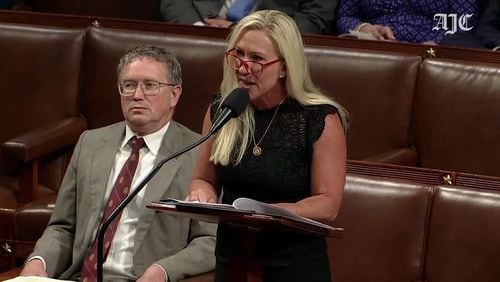You’ve heard of farmhouse cuisine. How about firehouse cooking?
Everyone has to eat, including firefighters. During their 24-hour shifts, firefighters find sustenance from food brought in from home, from ordering takeout, or even from attempting to dine in at a quick-service restaurant (with hopes of finishing the meal before responding to the next emergency). But, they cook at least one meal a day in the fire station kitchen.
DeKalb County Fire Rescue operates 26 fire stations. One of the best stations in DeKalb to fill up on good grub is Station No. 1, located on Clifton Road next to the Centers for Disease Control and Prevention and across the street from Emory Point. And the best day for dinner is when Capt. Brett Miller takes charge in the kitchen.
Miller has 20 years of fire service experience, but this first responder also knows a thing or two about cooking. He and his brother own a barbecue joint, Miller Brothers Rib Shack, with two locations in Dalton. A few weeks ago, Miller helmed the DeKalb County Fire Rescue barbecue team that participated in the Atlanta Kosher Barbecue Competition & Festival. They walked away with trophies that included first place for chicken, second place for beans and third for ribs.
On a recent Wednesday evening, Miller glided back and forth between the fire station’s kitchen and an outdoor deck, where he was smoking whole chickens. Wherever Miller went, so, too, was his walkie-talkie. A dispatcher’s voice droned in the background as Miller ticked off the evening’s menu. Besides smoked chicken, there would be bacon-ranch potato salad, baked beans “with a lot of stuff in them,” and broccoli-cheese cornbread.
Generally, it’s a meat-and-three style of cooking at Station No. 1. Miller described meals as “stuff that feeds a lot of hungry guys.” There is no cookbook to be found inside the kitchen cabinets, painted red and decorated with steel paneling to lend the look of a fire engine. Recipes might be passed down or “are made up on the spot,” he said. “Or we see something on TV and say, ‘Let’s try that.’” Ingredients are not measured; they are eyeballed.
Earlier that afternoon, Miller and a few other firefighters made their shopping run to a nearby Kroger. (Firefighters are not just assigned to a particular station, but to a particular crew. That same crew always sticks together, whether shopping for groceries or grabbing a pizza. And they never stray far from the truck.) At the grocery store, they grabbed produce — green onions, jalapenos, broccoli, potatoes — then scoured the meat section for sale items. That’s frequently how a meal is planned, Miller said, unless someone has a hankering for a particular dish.
Firefighters don’t eat for free. Just like the majority of employees everywhere, they have to pay for their own food. Anyone who partakes in the communal meal has to buck up. At Station No. 1, they try to keep costs to around $5 per person.
While Miller explained the ins and outs of firehouse food, rookie firefighter Willie Winfrey stepped in to lend a hand with prep. So, too, did firefighter Dave McBrayer. “Some of the guys don’t know how to boil water,” McBrayer chided.
McBrayer might have been flexing a culinary muscle to perhaps avoid a worse job (“If you cook, you don’t clean up,” he said), or just helping to ensure that dinner wouldn’t get on the table at an ungodly hour. When it comes to prep, the more hands, the better, because no one can predict when an emergency call is going to come in and bring the chopping, stirring, baking and boiling to a halt.
“You turn everything off, leave it sitting and pick it up when you come back,” Miller said. Firefighters are supposed to be on the truck within 2 minutes of being dispatched, he noted.
That particular Wednesday afternoon, a crew took off in the red engine three times in a two-hour span.
At any given time, the firehouse is staffed with six to eight responders. So, while one crew was responding to a medical emergency, the remaining bodies helped set up the long counter, buffet-style.
There was the chicken, lacquered in a spicy, smoky barbecue sauce. The cornbread was Jiffy, enhanced with cottage cheese, shredded cheddar and broccoli florets, baked in two cast-iron pans. The baked beans were a mix of great northern and kidney, jacked up with jalapeno, minced garlic, Creole seasoning and black pepper. A massive metal mixing bowl of potato salad was sprinkled with bacon and deftly dressed with a firehouse-made ranch. Someone had stirred up a couple of pitchers of sweet tea to wash it all down.
Miller said a prayer of Thanksgiving. The firefighters lined up, filled their plates, then took a seat around two big wooden tables. Five minutes later, the other crew walked in the door.
There were nods, smiles. They chatted about family, sports, work. They exchanged eye-rolls about the final presidential debate that would take place later that evening.
It was a family meal, just with a different family.
“You spend one-third of your life here,” said Tom Burrell, accreditation captain for DeKalb County Fire Rescue, who had stopped in for dinner that night. “Children’s birthdays, holidays, Thanksgiving — you are here,” he said.
Always thinking ahead, Miller recited the probable menu for Thanksgiving. The meal will need to serve 15 to 20 mouths. This time, wives and children will join their “other” family at the big wooden tables at Station No. 1.






